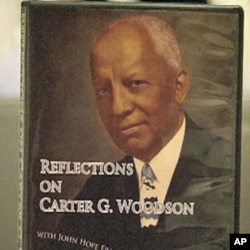Like his predecessors, President Donald Trump plans to commemorate Black History Month with an official proclamation, a gala and receptions at the White House to celebrate the contributions of the United States' black citizens.
"I'm proud to honor this heritage and will be honoring it more and more," Trump said Tuesday as he surrounded himself with African-American supporters and government officials invited to the White House for a listening session.
Black History Month is considered one of the nation's oldest organized history celebrations, and has been recognized by U.S. presidents for decades through proclamations and celebrations.
Harvard-educated historian Carter G. Woodson, a founder of the Association for the Study of African American History, began the celebration that became Black History Month.
Missing from classrooms
Woodson, the son of freed Virginia slaves, came up with the idea of Negro History Week, first observed in February 1926, to encourage black Americans to become more interested in their own heritage. He worried that black children were not being taught about their ancestors' achievements in American schools in the early 1900s.
"If a race has no history, if it has no worthwhile tradition, it becomes a negligible factor in the thought of the world, and it stands in danger of being exterminated," Woodson said.
Woodson chose February for Negro History Week because it contained the birthdays of President Abraham Lincoln and Frederick Douglass. Lincoln was born on February 12, and Douglass, a former slave who did not know his exact birthday, celebrated his on February 14. With the help of black newspapers, Woodson promoted the week that included those days as a time to focus on African-American history as part of the celebrations that were already ongoing.
Woodson saw Negro History Week as a time for student showcases of the African-American history they had learned the rest of the year, not as the only week black history would be discussed, said Daryl Michael Scott, a Howard University history professor and former ASAAH president. Woodson later advocated starting a Negro History Year, saying that during a school year "a subject that receives attention one week out of 36 will not mean much to anyone."
Individually, several places, including West Virginia in the 1940s and Chicago in the 1960s, expanded the celebration into Negro History Month. The civil rights and Black Power movements advocated for an official shift to Black History Month, Scott said, and in 1976, on the 50th anniversary of the beginning of Negro History Week, ASAAH made the shift to Black History Month.
Presidential recognition
Every president since Gerald R. Ford through Barack Obama has issued a statement honoring the spirit of Black History Month.
Ford first honored Black History Week in 1975, calling the recognition "most appropriate" as the country developed "a healthy awareness on the part of all of us of achievements that have too long been obscured and unsung." The next year, Ford issued the first Black History Month commemoration, saying that with the celebration "we can seize the opportunity to honor the too-often neglected accomplishments of black Americans in every area of endeavor throughout our history."
President Jimmy Carter added in 1978 that the celebration "provides for all Americans a chance to rejoice and express pride in a heritage that adds so much to our way of life." President Ronald Reagan said in 1981 that "understanding the history of black Americans is a key to understanding the strength of our nation."
Trump issued a proclamation Thursday declaring February as National African-American History Month. The text names Katherine Johnson, a mathematician and one of three black women whose roles in the space race were featured in the recent film "Hidden Figures."












